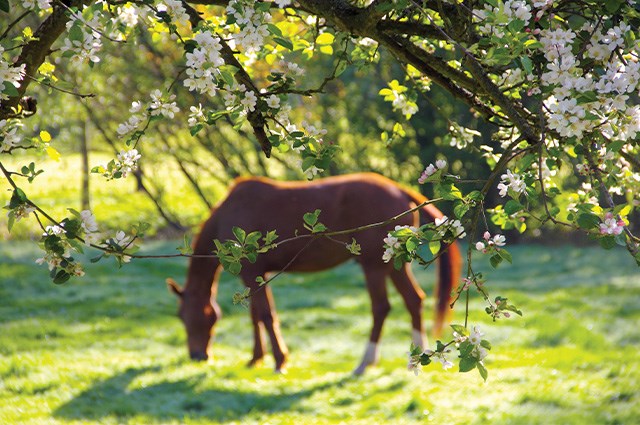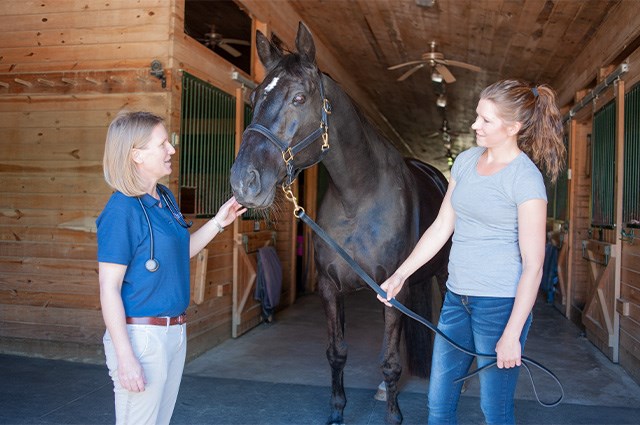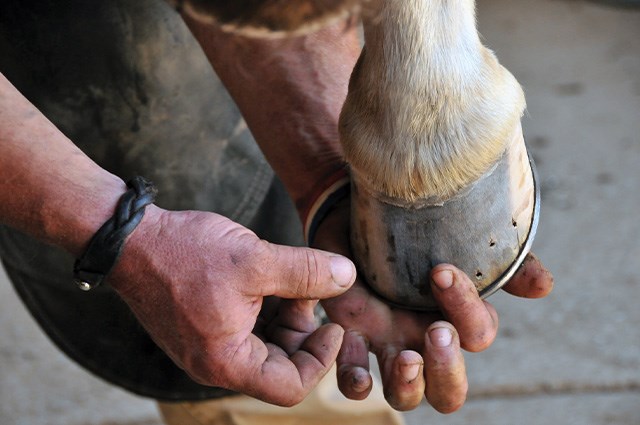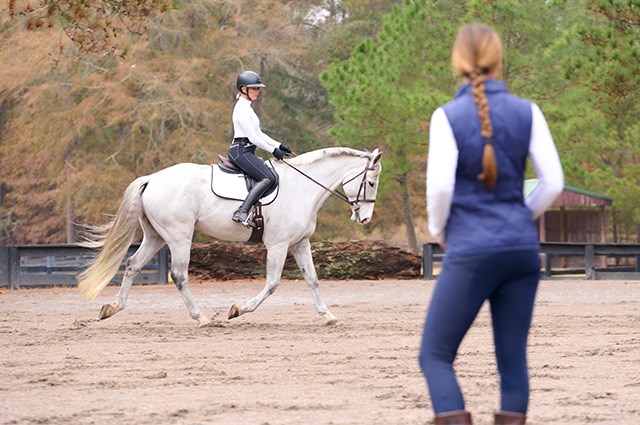Spring Horse Care
Management Strategies to Get Your Horse Ready for the New Season
By: Dr. Lydia Gray
Updated 3/30/2022
Houses get a spring cleaning, cars get a spring tune-up . . . why shouldn’t horses receive the same extra care and attention when the weather turns warm and their duties change? Make the most of the professionals available to you this spring season and learn as much as you can about your horse and his individual needs.

Spring Showers Bring Flowers… and Veterinary Visits
First, schedule a visit with your veterinarian. When you make the appointment, tell them you want a complete physical examination with extra time for questions and perhaps even a nutritional consultation. If you need a Coggins test, health certificate, or any other tests or paperwork, be sure to mention that as well.
Review with your veterinarian any problems that occurred over the winter or concerns about the upcoming season. Between this discussion and your veterinarian’s physical exam findings, you should be able as a team to develop a treatment or preventive maintenance program that is customized for your horse.

10 Tips for Your Spring Horse Care Checklist
During this visit, maximize the "quality time" with your veterinarian by getting involved. Stay organized by following this checklist:
- Learn how to body condition score and weight tape your horse properly.
- Determine if the type or amount of hay, grain, and supplements you feed needs to change.
- Take a core sample of your hay and give it to your veterinarian or equine nutritionist for analysis.
- Inspect your horse’s skin, coat, and hooves for quality or disease conditions.
- Discuss your horse’s parasite control program, submit a fecal sample, and later review the best strategy for deworming your horse.
- Make sure your horse is up to date on his annual vaccinations. The American Association of Equine Practitioners recommends every horse receive the core vaccines for Eastern/Western equine encephalitis, tetanus, West Nile virus, and rabies. Ask your vet about new diseases that may be occurring in your area, your horse's individual risk factors, and, if necessary, request specific vaccinations (such as Equine Herpesvirus – 1).
- With your veterinarian, examine your horse’s mouth and develop a dental plan (have your vet or an equine dentist float the teeth if necessary).
- Explain your riding plans for the show season and ask your veterinarian’s opinion on proper conditioning.
- Evaluate your horse’s risk for conditions such as colic, laminitis, and ulcers. Make sure you share your horse’s turnout schedule and changes with your veterinarian, including how much time he will be in his stall, turned out, and the quality of his pasture.
- Find out if your horse may benefit from electrolytes, antioxidants, joint supplements, or other products if you plan to travel or show.
Check-in with Your Horse Health Team
Other professionals you may need to schedule visits with include your farrier, equine dentist, and nutritionist. If you’re responsible for maintaining the farm’s pastures, you may want to work with someone from a university, county extension office, or even a feed dealer to prepare your pastures so they can support your horse(s) activity and nutritional needs.

Ensure your horse’s hooves get regular, professional maintenance throughout the springtime.
Ready to Spring Back into the Saddle?
Finally, whether you plan to show or just ride for fun, work with your trainer (if you have one) to design a training and conditioning program to prepare your horse mentally and physically. Incorporate your veterinarian’s recommendations on proper conditioning and remember that training is teaching your horse skills while conditioning is improving his flexibility, muscular strength, and cardiovascular fitness. You need both programs to succeed and to keep your horse sound.

Properly Prepare Your Horse for Work
In general, increase the intensity of your horse’s work OR the length/time, but not both at the same time. For example, if you have been walking your horse for 30 minutes a day during the winter, either walk for 25 minutes and trot for 5 minutes OR walk for 45 minutes. If you are still not sure how to apply this to your own horse’s training, watch the video below on creating an appropriate conditioning program for your horse coming out of winter.
For detailed instructions on how to prepare your horse for a specific discipline, such as dressage, three-day eventing, or reining, read Conditioning Sport Horses by Dr. Hilary M. Clayton.
SmartPak strongly encourages you to consult your veterinarian regarding specific questions about your horse's health. This information is not intended to diagnose or treat any disease and is purely educational.